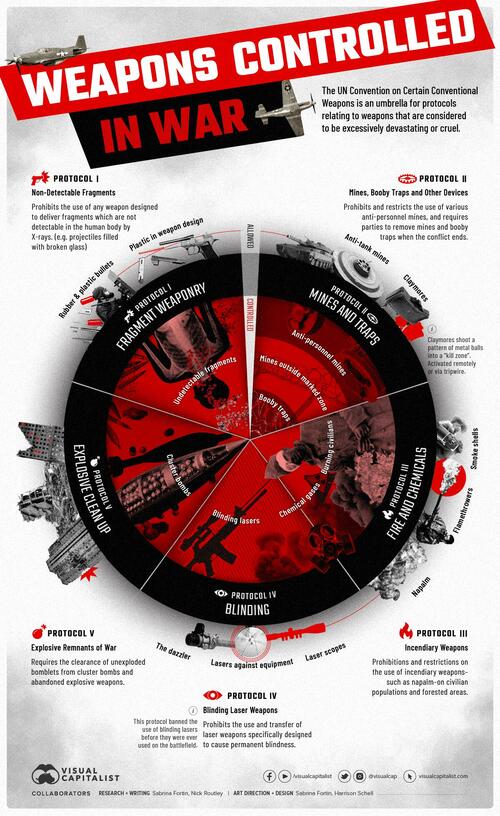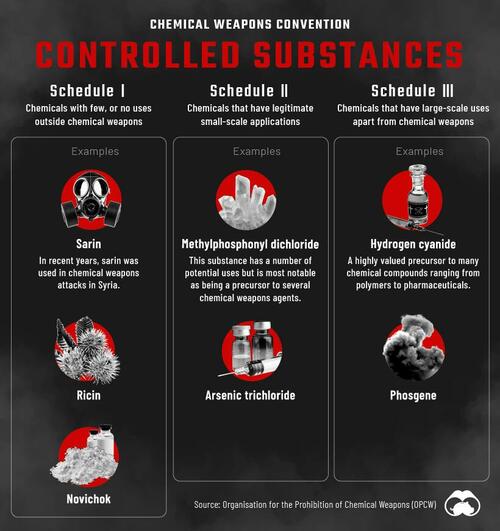For thousands of years, there have been rules to control the types of weapons in warfare - for instance, the use of poison in armed combat was forbidden in Ancient Greece.
But it wasn’t until the 19th century that international agreements were made to legally regulate the types of weapons that are allowed (and banned) in wars around the world.
In the infographic below, Visual Capitalist’s Carmen Ang and Sabrina Fortin outlines the weapons that are banned or limited in war, according to international humanitarian laws that are outlined in the United Nations Convention on Certain Conventional Weapons (CCW).
CCW and The Five Protocols
The CCW, also known as the Inhumane Weapons Convention, is an international agreement that restricts the use of weapons that have been deemed unnecessarily cruel and inhumane.
Currently, there are 125 State Parties involved in the agreement, with signatures from an additional four states.
In the CCW, there are five protocols outlined that restrict or limit the use of the following weapons:
- Non-detectable fragments: weapons specially designed to shatter into tiny pieces, which aren’t detectable in the human body. Examples are fragmented bullets or projectiles filled with broken glass.
- Mines, booby traps, and other devices: This includes anti-personnel mines, which are mines specially designed to target humans rather than tanks.
- Incendiary weapons: Weapons that cause fires aren’t permitted for use on on civilian populations or in forested areas.
- Blinding lasers: Laser weapons specifically designed to cause permanent blindness.
- Explosive remnants of war: Parties that have used cluster bombs in combat are required to help clear any unexploded remains.
It’s worth flagging that, under the CCW, the use of cluster bombs is not outright banned. However, their use and production is prohibited under separate legislation called the Convention on Cluster Munitions (CCM).
At this time, the CCW does not have enforcement processes in place, or systems to resolve any breaches of the agreement.
The Chemical Weapons Convention
Another international treaty that aims to limit the use of unnecessarily dangerous weapons is the Chemical Weapons Convention (CWC), which prohibits the creation, acquisition, stockpiling, and use of chemical weapons by State Parties.
193 State Parties have signed the CWC, and one more state (Israel) has technically signed the agreement but hasn’t yet made it official.
Syria signed the agreement back in 2013, but according to reports from UN human rights investigators, the Syrian government has used chemical weapons on numerous occasions throughout its ongoing civil war.
Is Russia Using Prohibited Weapons in Ukraine?
In the current conflict between Russia and Ukraine, it’s been reported that Russia’s been using several weapons that are banned by international legislation, including cluster bombs and explosive weapons. Harvard Law expert Bonnie Docherty explains why these weapons are so dangerous:
- They scatter submunitions over vast areas of land, meaning they can hit unintended targets
- Many don’t explode and end up laying dormant for years
According to reports from Human Rights Watch, Russia has been using cluster bombs in several areas of Ukraine, such as the heavily populated city of Mykolaiv, and in Solyani, a suburban area just outside of Mykolaiv.
AI in Weapons and Warfare
Over the last few decades, certain protocols and restrictions in the CCW have been amended and changed based on societal changes and technological improvements.
So, as military weapons continue to improve, and technology like commercial drones become more common, proper legislation around drone use in warfare may be necessary.
Currently, there is no international legislation that bans the use of drones in war. However, several global defense companies are popping up to try and find ways to counter these new military technologies. In fact, the global addressable market for counter drones and tracking systems is estimated at $10 billion worldwide.

